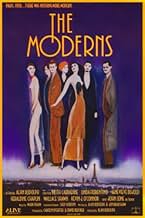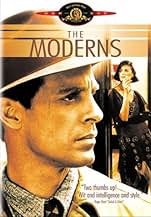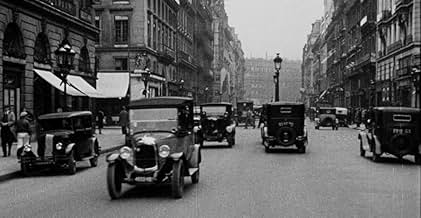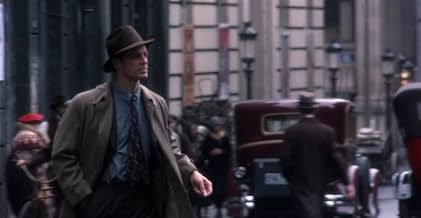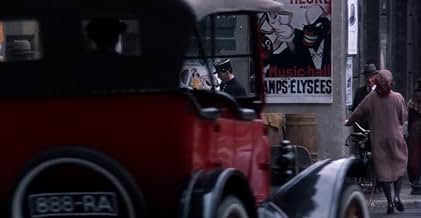CALIFICACIÓN DE IMDb
6.6/10
2.2 k
TU CALIFICACIÓN
Un artista en apuros es contratado para forjar pinturas, llegando a cruzarse con su exesposa y su poderoso nuevo esposo.Un artista en apuros es contratado para forjar pinturas, llegando a cruzarse con su exesposa y su poderoso nuevo esposo.Un artista en apuros es contratado para forjar pinturas, llegando a cruzarse con su exesposa y su poderoso nuevo esposo.
- Dirección
- Guionistas
- Elenco
- Premios
- 2 premios ganados y 5 nominaciones en total
Geneviève Bujold
- Libby Valentin
- (as Genevieve Bujold)
Charlélie Couture
- L'Evidence
- (as Charlelie Couture)
Véronique Bellegarde
- Laurette
- (as Veronique Bellegarde)
- Dirección
- Guionistas
- Todo el elenco y el equipo
- Producción, taquilla y más en IMDbPro
Opiniones destacadas
A couple years ago I saw Trouble in Mind, and was immediately absorbed in the atmospheric world the film portrayed. I have since been dying to see another movie by the same director. Well, I've just seen the Moderns, and was immediately disappointed. While the film shares the same claustrophobic tendencies of the previous work, in this one it doesn't seem as deliberate, but more a matter of budgetary restraints. I never got the feeling that I was watching Paris, or 1920's Paris, for that matter. All I got was the sensation of watching stilted actors playing dress-up. The dialogue and plot for this movie is b-movie crust, which can be good, but the dreariness of the action and the way in which the film was filmed left it almost completely vacant of any charm. Cute references to pop culture from the 20's only sounds contrived and makes the film more apparent of what it isn't. One should get the feeling one is watching the 20's unfold without the crutch of references. We are never given any reason to care for any of the actors. They are cartoonish, but not cartoonish enough for them to be relieving and enjoyable. This movie takes itself far too seriously to be enjoyed as camp, which makes scenes involving fake suicide and real suicide all the more dour. The sets are perhaps more wooden than the characters, Hart's art atrocious. Hemmingway appears as a jocular Ethan Hawke ruffian, a pale shadow compared to Hart's masculinity. Lampooning famous people can be fine, but not when the only purpose of it is to rip them off and make them a clown with no real relevance to the story. I did, however, like the portrayal of Gertude Stein as a cliquish art snob. That's a more fair assessment. To be missed or slept through.
Nick Hart (Keith Carradine) is an ex-patriot American painter who lives in Paris in the 1920's. He picks up some money selling caricatures but is very poor. An art gallery owner, Libby (Genevieve Bujold) is sympathetic but can't muster up many sales for Nick's work. Now, a wealthy divorcée. Nathalie (Geraldine Chapman) commissions Nick to make copies of some expensive paintings, as a sort of plot against her ex-husband. Reluctantly, Nick agrees. Complicating matters further is the fact that when Nick frequents his favorite bar, which is quite often, he runs into a beautiful, beautiful woman named Rachel (Linda Fiorentino) who happens to be married to a rich American businessman, Bertram (John Lone). Wouldn't you know, Bertie is a sadist and controls Rachel with an iron fist. He loves to do things like shave under Rachel's arms with a straight razer! So, two things are paramount to Nick. Will he begin to sell his art and will he be able to win Rachel away from her husband? This is quite a lovely film with a very great cast. Carradine does a fine job as the main character while Fiorentino is extremely lovely and touching. But, its Lone who practically steals the show, with his terrifying turn as the bad, bad guy. Most everyone will appreciate the gorgeous sets, costumes, art direction and photography. Then, too, the script is first rate while the direction is most competent. Look for the Moderns on your next video run.
This may not be everyone's cup of tea, but it has a genuine, unpretentious charm to it that I found appealing.
Alan Rudolph made this delightful little ode to lies, trickery and delusion on a shoestring budget. The story of a failed painter down on his luck in Paris in the 1920's who accepts a comission to forge a famous impressionist painting. The film questions what is real versus what is perceived or subjective. In a series of criss-crossing subplots and seemingly random encounters Rudolph has fun playing with the trickery of film to made some sly points about the art forms we hold dear.
The film was shot in Montreal, Canada, standing in for Paris and New York in the 1920's, with French-Canadian actors playing Parisians... The plot twists include a millionaire art collector publicly slashing a priceless painting, thinking it a forgery, while the fake painting is sent to hang in a New York museum. A Dadaist poet fakes his own death in order to attend his funeral to hear the things people will say about him. Same character, named L'Oiseau is actually an American ex-patriate named Fagelman! In a toungue-in-cheek hommage to people's perception of the period, Rudolph has Papa Hemmingway hanging-out in all the cafe's and at all the parties... He is seemingly everywhere, sipping scotch and mouthing tough-guy cliches...
But the viewer must beware of what he is watching. In a scene where Bujold's character rides in a taxi with Carradine's we are treated to lovely rear projection shots through the cab's back window of impressionist paintings of Paris at night! In another dimly lit cafe scene Rudolph chose to end the scene by panning away from the action to the bar where among the extras in period costume, two punk rockers are watching a hockey game on t.v.
Alan Rudolph made this delightful little ode to lies, trickery and delusion on a shoestring budget. The story of a failed painter down on his luck in Paris in the 1920's who accepts a comission to forge a famous impressionist painting. The film questions what is real versus what is perceived or subjective. In a series of criss-crossing subplots and seemingly random encounters Rudolph has fun playing with the trickery of film to made some sly points about the art forms we hold dear.
The film was shot in Montreal, Canada, standing in for Paris and New York in the 1920's, with French-Canadian actors playing Parisians... The plot twists include a millionaire art collector publicly slashing a priceless painting, thinking it a forgery, while the fake painting is sent to hang in a New York museum. A Dadaist poet fakes his own death in order to attend his funeral to hear the things people will say about him. Same character, named L'Oiseau is actually an American ex-patriate named Fagelman! In a toungue-in-cheek hommage to people's perception of the period, Rudolph has Papa Hemmingway hanging-out in all the cafe's and at all the parties... He is seemingly everywhere, sipping scotch and mouthing tough-guy cliches...
But the viewer must beware of what he is watching. In a scene where Bujold's character rides in a taxi with Carradine's we are treated to lovely rear projection shots through the cab's back window of impressionist paintings of Paris at night! In another dimly lit cafe scene Rudolph chose to end the scene by panning away from the action to the bar where among the extras in period costume, two punk rockers are watching a hockey game on t.v.
This film is, first of all, a love story--but a remarkably surprising one, and by no means ordinary. It starts with the usual expectations most of us have about Paris that Woody Allen recently utilized so effectively in Midnight In Paris, but instead of broad comedy, Director Alan Rudolph weaves a fascinating tale of intrigue in the art world, and peppers it with wit and ambiguity.
The smoky Parisian ambiance of Bohemian Cafes (mostly created in Canada) introduce the viewer to Keith Carradine's stereotypical starving artist--except that Carradine's role is written to surprise, and one is drawn into a labyrinth of conflicting emotions very quickly indeed. This film, like Thieves Like Us, demonstrates what a fine under-utilized actor Carradine continues to be.
The feeling of elation that comes from escaping from one's cares in another place washes through every bar and café and art opening, and the performances from such vibrant actors as kinky Geraldine Chaplin and quirky Wallace Shawn--and especially the intensely cold and controlled and fascinating John Lone enliven the two hours that linger long after the film is finished.
The smoky Parisian ambiance of Bohemian Cafes (mostly created in Canada) introduce the viewer to Keith Carradine's stereotypical starving artist--except that Carradine's role is written to surprise, and one is drawn into a labyrinth of conflicting emotions very quickly indeed. This film, like Thieves Like Us, demonstrates what a fine under-utilized actor Carradine continues to be.
The feeling of elation that comes from escaping from one's cares in another place washes through every bar and café and art opening, and the performances from such vibrant actors as kinky Geraldine Chaplin and quirky Wallace Shawn--and especially the intensely cold and controlled and fascinating John Lone enliven the two hours that linger long after the film is finished.
This is a fairly enjoyable tale set in the art world of 1920s Paris. The look of the film and the mood it creates are the most important things; far more important than the enjoyable, yet slow-moving plotline.
It is highly imaginative and its representation of icons such as Ernest Hemingway and Gertrude Stein add an extra dimension to the film.
The only true weak points are some of the dialogues between the two leads; it is sometimes out of place and almost too 'modern'!
All the performances are good but John Lone and Keith Carradine are especially suited to their parts.
It is highly imaginative and its representation of icons such as Ernest Hemingway and Gertrude Stein add an extra dimension to the film.
The only true weak points are some of the dialogues between the two leads; it is sometimes out of place and almost too 'modern'!
All the performances are good but John Lone and Keith Carradine are especially suited to their parts.
¿Sabías que…?
- TriviaIsabella Rossellini screen-tested to play Nathalie DeVille, but lost to Geraldine Chaplin.
Selecciones populares
Inicia sesión para calificar y agrega a la lista de videos para obtener recomendaciones personalizadas
- How long is The Moderns?Con tecnología de Alexa
Detalles
Taquilla
- Presupuesto
- USD 3,500,000 (estimado)
- Total en EE. UU. y Canadá
- USD 2,011,497
- Fin de semana de estreno en EE. UU. y Canadá
- USD 20,283
- 17 abr 1988
- Total a nivel mundial
- USD 2,011,497
- Tiempo de ejecución
- 2h 6min(126 min)
- Color
- Mezcla de sonido
- Relación de aspecto
- 1.85 : 1
Contribuir a esta página
Sugiere una edición o agrega el contenido que falta





